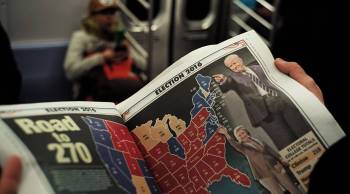KAI RYSSDAL: Polls all summer showed what voters wanted. Near the top of the wish list are lower energy costs. And we’ve been getting them recently . . . With falling gas prices. But OPEC showed us what-for today. Crude prices jumped 3.4 percent. The cartel’s following through on the production cuts it promised last week.
The news fits nicely with today’s Real Agenda, our look at what voters really want to hear about this election season.
David Frum is a resident fellow at the American Enterprise Institute. Robert Reich is a professor of public policy at the University of California, Berkeley. Both of them are regular commentators for us. And Bob, the first question this week goes to you. The president said it back in his State of the Union address. That we’re addicted to oil. A lot of it imported. Do you see us being able to change that?
ROBERT REICH: Well, I doubt we’re ever going to become completely energyh independent. We’re not going to be completely independent with regard to anything. We’re part of a global economy. My concern is that the Administration’s policy has been basically to make life easier for oil companies. You see, there are two major costs with oil: One is foreign policy — a foreign policy that basically puts us where we are in the Middle East and creates a lot of dictatorships around the world. And secondly, an environmental cost. Because oil and fossil-based fuels like oil, are generating an unsustainable planet. So we have no choice but to use our power, our economic power, to do something that is as dramatic as getting to the moon. And that is founding entirely new, non-fossil-based energy sources. We can do it.
RYSSDAL: David Frum, what do you say to that? Can we, in essence, go to the moon again?
DAVID FRUM: The United States has invested a lot of money —tens of billions of dollars — over the past three decades in research and development for new sources of fuel. And that’s a good policy and let’s hope the money continues to be invested, and let’s hope that it someday pays off. Meanwhile, the most promising non-fossil fuel that we have, which is nuclear power — something that has largely been shut down in the United States — perhaps we can hope to see that return. But we have to do policy on the basis of the technology that exists or will soon be available. And that means that the United States is going to need a lot of hydrocarbon fuels. It’s going to need a lot of oil. And what we have to be concerned about is how do we make sure that that is stable and reliable. And that does mean more drilling. I think it is often true that what Americans want is cheap oil with no drilling. You can’t have that. If you want to have a stability of supply, you have to have a lot of exploration. And that’s not a favor to the energy companies. They make their margin whether they sell a lot of oil or a little bit of oil. That is a favor to oil consumers who depend on oil companies to bring them the product they need.
RYSSDAL: Bob Reich, how big a problem is it for the energy industry, when Chevron is making a $10 billion profit every quarter, to have the public believe there is any incentive there to go after alternative energies?
REICH: The energy industry, particularly the oil companies, are sitting very fat and happy. In fact, they have so much money they’re buying back their stock in order to push stock prices even higher. They don’t have too much incentive to find alternative sources of energy. David, you say that we’ve invested tens of billions of dollars over the past few years. Well, in fact, I have the figures in front of me. It’s hundreds of millions, it’s not tens of billions in alternative energy fuels. That big energy bill last summer had a pittance for non-fossil-based energy exploration. Look, we don’t have to be content with technologies s as they are. We, the United States, championed the development of the entire telecommunications industry. And that came largely out of national defense. We did it with computers. We did it with aviation — that also was a product of national defense. We have the ability. We have the money. We have everything except the political will to develop alternative, non-fossil-based energy sources. We ought to be doing it as a matter of national security. We ought to be doing it as a matter of the welfare of the planet. We ought to be doing it for our grandchildren.
RYSSDAL: David Frum, I want to turn to you on this point as a Washingtonian. And whether or not you think it’s politically realistic to expect all these alternative energies to be sprouting up in the next 10 or 15 years.
FRUM: It’s not a matter of politics, it’s a matter of markets. Anyone who lived through the 1990s, especially someone like Bob Reich who lived through them in a very visible place, knows that if you have a very promising technological idea, it is not difficult to raise enormous amounts of capital for it in the United States. And even if the energy companies were just as stupid and complacent and dumb as General Motors at its worst, there are hungry entrepreneurs out there who, if they saw a technology, would bring it to market. And just like those eight guys who thought that you could run a PC as efficiently as a giant computer room and invented Microsoft, there would be somebody who would take a new technology to market, find capital, find consumers. When that technology appears, there will be no difficulty capitalizing it and we will not need the U.S. government to do it. The problem is, the technology has not appeared. We live in an oil economy. Yes, let’s try to make a transition from it to the extent that government can. Let’s count on markets to do a large part of their work. But in the meantime, we need energy prices that take the reality of the country’s need for oil, and the country’s need for electricity. I am startled how often I hear people say we need to make the move away from fossil fuels and yet not address at all the obstacles — and those are political — to the spread of nuclear power. The United States derives about 20 percent of its energy from nuclear power. Other countries . . . France, for example, derives more than three-quarters, Japan more than half. This is a safe and reliable technology. It is expensive. But, you’re not going to be . . . I tell you, you’re not going to be able to run an economy like the United States’ on decaying leaves.
RYSSDAL: And we leave it there this week. Bob Reich, David Frum, thank you very much.
FRUM: Thank you, Kai. Thank you, Bob.
REICH: Well, thank you, Kai. Thanks, David.
There’s a lot happening in the world. Through it all, Marketplace is here for you.
You rely on Marketplace to break down the world’s events and tell you how it affects you in a fact-based, approachable way. We rely on your financial support to keep making that possible.
Your donation today powers the independent journalism that you rely on. For just $5/month, you can help sustain Marketplace so we can keep reporting on the things that matter to you.


















